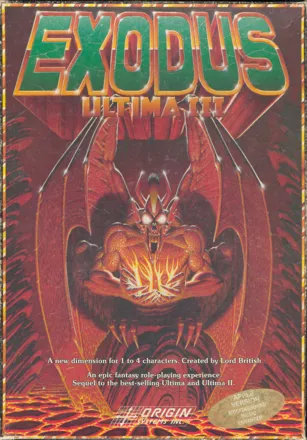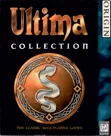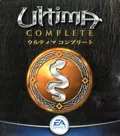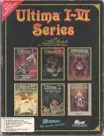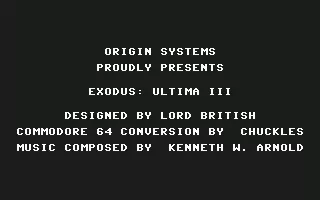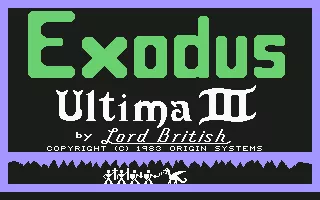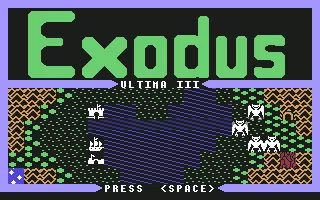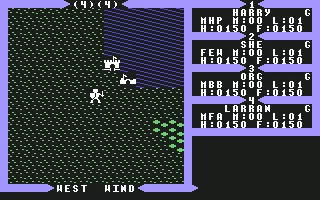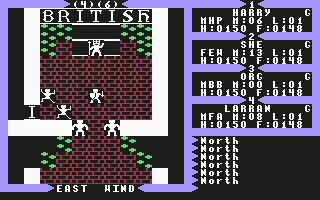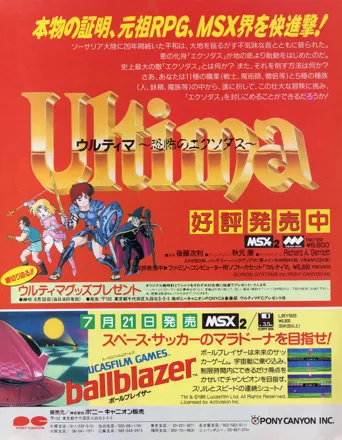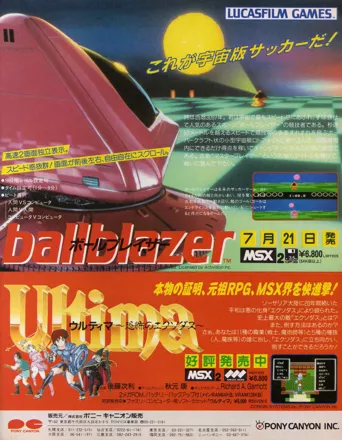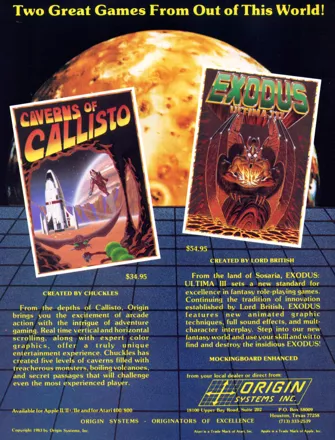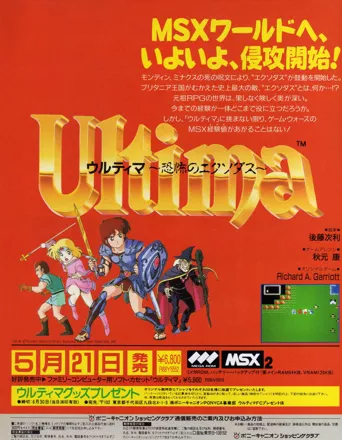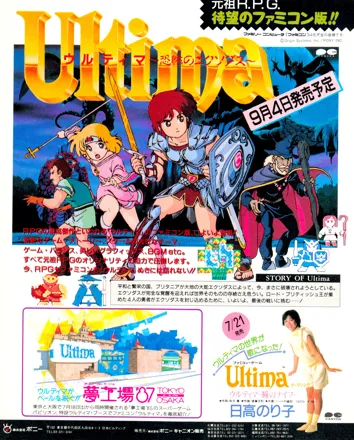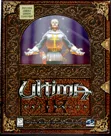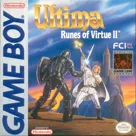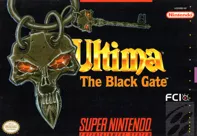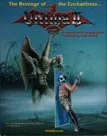Exodus: Ultima III
Description official descriptions
After the defeat of the evil wizard Mondain and his mistress Minax in the previous two Ultimas, peace has returned to the land of Sorsaria. Times passes and eventually geological disruptions and a resurgence of the monster populace occur, and it is soon learned that Mondain and Minax had conceived a child named Exodus before their death. Now that child has become an adult with the power to avenge the death of his parents. Obviously, it falls upon the hero from Earth to find and stop him.
The third title in the Ultima series was the first to feature a party of adventurers instead of a single player character. The party is created at the beginning of the game by assigning various class combinations and determining the characters' attributes. The game has larger and more detailed towns, populated by NPCs the protagonist can converse with to obtain clues. Like in earlier Ultima games, exploration is divided between top-down overworld locations and first-person 3D dungeons. This installment introduces separate combat screens where player-controlled party fights multiple monsters in a turn-based tile-based system.
Spellings
- ウルティマ3 エクソダス - Japanese spelling (PC-98 title)
- ウルティマ〜恐怖のエクソダス〜 - Japanese spelling (MSX version)
Groups +
- Fantasy creatures: Dragons
- Fantasy creatures: Dwarves
- Fantasy creatures: Elves
- Fantasy creatures: Goblins
- Fantasy creatures: Griffins
- Fantasy creatures: Orcs
- Fantasy creatures: Trolls
- Gameplay feature: Horse riding
- Gameplay feature: Hunger / Thirst
- Games made into comics
- Physical Bonus Content: World Map
- Protagonist: Female (option)
- Ultima series
- Ultima universe
Screenshots
Promos
Videos
See any errors or missing info for this game?
You can submit a correction, contribute trivia, add to a game group, add a related site or alternate title.
Credits (Commodore 64 version)
| Designed by | |
| Commodore 64 Conversion by | |
| Music composed by |
Reviews
Critics
Average score: 75% (based on 11 ratings)
Players
Average score: 3.7 out of 5 (based on 139 ratings with 7 reviews)
The Good
This is the first game in the series that really feels like a Ultima. It has a lot of the standard elements that were in the later games such as moon-gates, an underworld and familiar towns like Yew. The modern technology has gone and the game takes place in a true fantasy environment. The game also has a musical soundtrack (with the upgrade patch) which although basic helps the atmosphere no end.
You control a party of four adventurers and combat takes place on its own screen, where you can move your characters around, attack or cast spells in turns. This is far more interesting than the mindless attacking from the earlier games.
The characters in the towns still only offer one line of conversation but there are far more characters that have something worthwhile to say. These tend to be hints you need to complete the game, and it adds another gameplay element where you have to search through the towns to get all these clues.
The game also adds line of sight so you can't see around corners, and viewing distance is limited in forests.
The Bad
Some of the spells are not as useful as they should be. The light spell lasts about 8 turns before you are in the dark again and with wind blowing out your torches all the time, you need a serious supply before tackling any dungeons. The clerics heal spells seemed a bit underpowered at the start of the game but are even worse later on.
Ships are far too rare, in this game considering you need one to show up before you can finish the game.
The Bottom Line
This game is a real classic - the beginnings of everything that Ultima developed into can be seen here. The gameplay is far more balanced and varied than the previous games and it doesn't feel like a load of elements thrown together ad hoc. It was fun to play through 25 years after it came out. I did use the upgrade patch from http://exodus.voyd.net. This adds a frame limiter, midi music (previously missing on the PC), EGA graphics and also a very useful restore hot-key (this required a restart otherwise).
If you are an Ultima fan and can see past the technology, this game is still worth playing even these days. Back in 1983, had I been old enough to appreciate it, it would have been truly outstanding.
DOS · by Pix (1172) · 2008
Great design, great atmosphere -- still highly enjoyable today
The Good
*** WARNING: Mild spoilers ***
Unlike Ultima II, whose bad game design truly appalled me, Garriott got nearly everything right here. I really was afraid that Ultima III may be just as bad, but thankfully, it's quite the contrary.
Character generation already is the first sign of some good game design. This is the first Ultima game in which you lead a party of characters, not a single maverick. Although character creation is very basic (choose name, sex [including 'other'], race and class; distribute points; done), there are enough classes that assembling a cool, balanced party is already quite challenging. There are four base classes, but several mixed classes. In fact, I created three parties in the course of playing the game, and I still haven't found the "perfect" one.
Once you start playing, you'll notice pretty soon that Garriott took MUCH more care in designing the maps and NPCs. Ultima II actually is bigger than Ultima III, if you just count the number of squares -- but one thing I hated about U2 was that many of those maps just were unnecessary for the game, and some of them (as in space) were even totally empty. If not, most of the NPCs just gibbered nonsense.
Here, each location serves a purpose, and each has its own feel, and often some special that only appears there. While Britain is more or less a straight fantasy setup, Yew is a small village full of clerics and dark forests. Grey is a somewhat dubious town; unlike in Britain, the guards here will bark a "Watch it Bub!" as a greeting, and the pub is crammed full of fighters, with the much-needed thieves' guild in a backroom. Or that mystical place called Dawn, which you'll try to reach in the beginning of the game. "Dawn lasts only a brief moment" -- which means that it only appears at a special time, indicated by the moons. (Yes, Ultima III introduced moongates.)
Back in 1983, this was a degree of detail and atmosphere of the game world absolutely unheard of in role-playing games. For me, atmosphere is one of the most important things in games. It helps to create an image in your mind. And even if you'll have to grind a lot in this game too (RPGs should be called "Grinding games" anyway), it didn't get boring a bit. It took me a while to find a good grinding route, and though I must have plundered this poor town dozens and dozens of time, it was fun. I mean, the guards literally invited me, telling me to bribe them.
There are many other examples of Garriott's great game design -- which I strongly started to doubt while playing U2. This game keeps surprising you. For example, I once stumbled upon an easily accessible room full of treasure chests in a town. I never dreamed of stealing it -- being level 1, I wanted no stress with the guards --, but just went to have a look. Once inside, a thief hidden in an previously unseen corner of the room attacked me. I had no choice but to defend myself -- however, the guards don't like fights in their cities and went after me. Although this example is a little unfair, I just loved it. It was a great use of the game mechanics to give the player a nasty little surprise.
Another example is that whirlpool that moves randomly out in the ocean. After I had won my first ship by fighting the pirates (using that cool "Pirate ship/land combat map" I remember well from Ultima IV), I had left it by the coast while riding to another part of Sosaria. Suddenly, the beeper makes a weird noise and I read: "A ship was destroyed." I knew that could only be the whirlpool. When, after much searching, I found another ship, I took care to always leave it at the source of the longest river I could find, so that the whirlpool is less likely to reach it. I also was terrified of that whirlpool while sailing the oceans, looking for that mystical "Ambrosia" people kept telling me about, and kept sailing away from it as soon as I saw it (it moves lightning-fast, the bastard). Of course, after some time, the pool got me... And oh, what a surprise that was! Another moment in my personal gaming history I won't forget.
I also liked the way the game unfolds. Never once I was stranded somewhere, not knowing what to do. In fact, it would have been the other way round if I hadn't kept notes (a "to do" list). While exploring, you'll learn about cards, marks, panels, shrines and whatnot, and slowly, you'll learn what they are, how they work, and what they've got to do with your quest.
Apart from the great game design, there's a lot of smaller and larger technical details that add to the experience. For example, U3 introduces line-of-sight visibility and makes great use of it. For example, many hints (or city guards) are hidden in deep forests. Although this makes exploring a little hard, it is rewarding, as -- unlike as in U2 -- if the NPCs say something, it either adds to the atmosphere, or it contains some hint.
I can't complain about the gameplay either. You'll learn the basic commands pretty soon (most are similar to other early Ultimas), and the game plays quick and smoothly. Some of the dialogues are a bit uneven (sometimes requiring player first, then direction; sometimes the other way round), but there wasn't many of those fun-killing "Huh? What the fuck does that stupid game do now!?" stuff.
One last thing I have to mention is the combat. In U2, you had simple "bash me, bash you". Here, similar to U4, a combat map opens, depending on the territory you're on, and you'll have to fight intelligently, developing several strategies and tactics, to survive. It reminds me a lot of SSI's Gold Box games, albeit much simpler.
The Bad
I have a few gripes about Ultima III. My main one being that leveling up is quite uneven. You level up every 100 experience points, regardless of your level. Which means you'll spend HOURS getting to second level (my party died three times) at the beginning of the game, when lowly orcs are a challenge. However, at the end of the game, when even Lord British refused to level me up any higher, it took me a mere MINUTES -- a few fights with guards -- to gain another level.
Another annoying thing was that autosave feature: The bloody game saves your characters as soon as one of them dies. I mean, being a roguelike fanatic, one should think that I'd appreciate that "permadeath" feature. But permadeath is only okay if it doesn't take hours to build up the character. Here, I just found it annoying. However, once you get past the difficult beginnings, dead characters become less of a drag, with having more money and even spells.
As mentioned, some of the user interface could have been a bit smoother, but it didn't suck. Also CGA graphics aren't my cup of tea, but then again, there's the Exodus Upgrade which gives you U4-style EGA graphics, but which I didn't use as I wanted the original.
The Bottom Line
All in all, Ultima III is actually pretty amazing for its time, and still worth playing today, after 29 years (and counting)!
It's got tons of atmosphere, a consistent, imaginative and varied game world. It's game mechanics pretty simple, so the game is easy to get into. But the game design is great, and it uses its mechanics to maximum effect, providing lots of surprises, some nasty, some nice. I really enjoyed the game from start to finish, thoroughly exploring the world. I even continued after I solved it, to answer a few open questions. Like: Can you kill Lord British? (Answer: Yes, you can, even if Garriott made him invincible in combat. But he forgot that ship in the castle.)
After Ultima II, which is extremely uneven, boring and just plain badly designed, Ultima III shows that Garriott knows how to create great games. It definitively is a big step towards Ultima IV -- in fact, I had the feeling that all basic game mechanics are already present and working in Ultima III (but I played U4 about 15 years ago, so...).
In fact, I can imagine that I may like this just as much or even better than Ultima IV. U3 isn't politically correct. And even if it's not much in my role as saviour of the world, I enjoy being evil and nasty, slaughter entire villages and rob their gold, from time to time. I also liked Lord British's luxurious torture chamber, where he burns and drowns jesters who were naughty. I think I'll miss that in Ultima IV, which I'm definitively planning to play some time soon.
DOS · by General Error (4328) · 2012
At least it's not as bad as the Ultima 7 port.
The Good
The absolute best thing about this port is the music. The original computer versions of this game were old enough that the most you had to look forward to were the standard blips, bleeps, and blorps of the PC speaker. Fans eventually created a MIDI patch to add music to the game, but even those songs don't compare to Pony Canyon's musical offerings.
Particularly haunting is the opening theme. It starts with a low hum, then grows into a discordant, running harmony, interrupted with the occasional off key effect. Something about it all just clicks.
The other nice thing I can say about this port is that it's fairly faithful to the original game in terms of the game structure, though it has all of the obligatory limitations of a port to a console. Less text, fewer commands, etc.
The Bad
First of all, no way around it, this game is ugly. Even the stick figure graphics of the Apple II version hold up better than this mess. The characters have about as much definition and charm as a smudge, and not the kind that you can see the Virgin Mary in.
Graphics may not be everything, but this is a third/fourth generation game, released in Japan in 1987. That's the same year as Final Fantasy. Looking at it, you can just tell they didn't spend a dime more than they had to to get the graphics finished. This stands in especially appalling contrast to the superb musical score.
Like a lot of RPGs of it's era, this game is ludicrously difficult at times and is horribly unbalanced. The instruction manual that shipped with the game is bare bones, telling you little to nothing about what the different classes are and do, or what the implications of choosing one race over another are.
Many of the classes are redundant or overlap in some fashion or another. I don't know for certain if this is a flaw of the original or if this version is simply bugged, but there's no good reason to not fix these flaws if they were a holdover, or at least warn players that the bard and ranger classes are worthless.
The combat system is often aggravating. Particularly, it's difficult to level up certain classes because they can't use ranged weapons. Weapons in general are pathetically weak too. The magic users have attacks that are instant death for goblinoids or undead, respectively, making choosing a fighter class kind of moot, especially early on. Enemies can attack you at any angle, but you can only attack in the cardinal directions, leading to a lot of cheap shots. I could go on here, but I think you get the point.
The limitations in the text mean the clues and hints that NPCs give you are pretty cryptic a lot of the time. In the original, if you asked the right question, you'd get a paragraph or more to work with. Here, you don't have to know what to ask, but you get a line or two at best.
There's a lot of stuff in the game that's completely irrelevant to the plot so you can wind up running around on what are not exactly side quests, wasting your time on doing things that ultimately grant you nothing in exchange.
The Bottom Line
The first three Ultimas were more like giant puzzles than stories.
Unlike traditional RPGs, leveling up only increased your HP, as well as the difficulty of enemies that would show up on the map. In order to increase your stats, you had to pay one or more particular NPCs or shrines, or some such thing.
There was always a city or dungeon that could be raided over and over to produce the needed booty, so it was just a matter of stumbling upon the trove. Once loaded up, you visit your shrine and pump your stats. In this way, you were actually punished for leveling up too much until you could bribe your way to full strength.
If you're looking for a console RPG, there's only about an hour's worth of gaming in here. No, the game takes longer to complete, a few hours if you know what you're doing, much longer if you don't, but you only actually play the RPG part of it for a fraction of that time. The rest is spent on executing this repetitive loop of stealing, bribing, etc.
You might like this if you're a die hard fan, but really, this game is mostly a chore. Spend the time more wisely and clean your bedroom or something.
NES · by Nancy "Infested" Kerrigan (36) · 2011
Discussion
| Subject | By | Date |
|---|---|---|
| PC-98 version - remake? | Trypticon (11023) | Mar 8, 2011 |
Trivia
Certificate
Starting with Exodus, Origin began offering certificates, signed by Lord British, to players who completed the games.
Game Boy Color port
In 2001 Sven Carlberg made an unofficial port of Ultima III: Exodus to the Color Game Boy, featuring graphics and music largely adapted from the C64 version, fortified with an additional game following the completion of the regular game. A year later, he released its source code. For more (including free download of the playable version!) check http://gonow.to/sven/
Japanese Song
The theme song of the Japanese Famicom and MSX game was a digitised version of a song released concurrently with the game, ウルティマー瞳のナイフー (Ultima - Knife of the Eye), sung by Noriko Hidaka.
Lord British
This is the first Ultima in which Lord British's hit points are static (you can't lower them), making him unkillable in combat. In the first two games British had a ton of health but could eventually be killed by a strong enough character. From Ultima III onward, British is unkillable by normal means.
However, he still can be killed. There's a boat in his castle behind some locked doors that can be used to sail around the moat in. Get British pissed off by wacking one of his jesters then head towards the boat and sail to the front of the city. Wait there until he shows up and cut loose on him with the ship's cannons.
PC version
There is no music in PC version, but there exist a freeware patch that adds all the music from Apple/C-64 -versions to play properly with the PC version as MIDI. There are a freeware EGA graphics patch available as well.
Most people don't know that the IBM PC port is supposed to be played on an IBM CGA with a *composite* color monitor. Using that configuration, the pink-striped borders become a solid dark blue, the white-speckled road tiles become a bright red, and the cyan trees appear as green.
Remake
An unofficial shareware remake for Macintosh of this game was created and released by Lairware, featuring improved graphics including color and detailed sprites (hair, faces, etc).
Title
The title, Exodus, is a nice irony, considering that Lord British took leave of Sierra to found his own company, Origin, during the game's development.
Awards
- Computer Gaming World
- November 1985 (Vol. 5.5) - Adventure Game of the Year (Readers' Choice)
- March 1988 (Issue #45) – Introduced into the Hall of Fame
- November 1996 (15th anniversary issue) – #144 in the “150 Best Games of All Time” list
- November 1996 (15th anniversary issue) – #15 Least Rewarding Ending of All Time
- Electronic Gaming Monthly
- December 1989 (Issue 5) - Best RPG Video Game (NES version)
- December 1989 (Issue 5) - Worst Ending in a Video Game
- GameSpy
- 2001 – #41 Top Game of All Time
Information also contributed by Eisentel, Jason Gilchrist, NewRisingSun, Pseudo_Intellectual and Ye Olde Infocomme Shoppe
Analytics
Related Sites +
-
SOUND/EGA/Windows XP Upgrade for Exodus
An upgrade for Exodus with more colors and sound support for WIN XP. -
Ultima III MAC upgrade
Exodus upgrade for MAC OS with new graphics and full music and speech support.
Identifiers +
Contribute
Are you familiar with this game? Help document and preserve this entry in video game history! If your contribution is approved, you will earn points and be credited as a contributor.
Contributors to this Entry
Game added by Alan Chan.
Macintosh, Sharp X1, Atari 8-bit, FM-7, PC-88 added by Terok Nor. MSX added by koffiepad. PC-98 added by Unicorn Lynx. Atari ST added by Belboz. Apple II, Commodore 64, NES, Amiga added by Jeanne. Windows added by eWarrior.
Additional contributors: Rebound Boy, Unicorn Lynx, Corn Popper, Alaka, Игги Друге, BostonGeorge, Patrick Bregger, Narushima.
Game added February 21, 2000. Last modified November 25, 2024.


